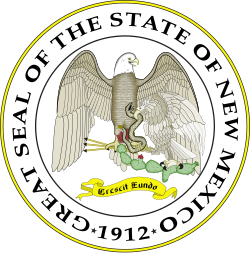Republican Party of New Mexico | |
|---|---|
 | |
| Chairperson | Amy Barela |
| Senate Leader | William Sharer |
| House Leader | Gail Armstrong |
| Headquarters | 5150-A San Francisco Road NE Albuquerque, New Mexico 87109 |
| Membership (2021) | 425,651 [1] |
| Ideology | Conservatism |
| National affiliation | Republican Party |
| Colors | Red |
| Seats in the United States Senate | 0 / 2 |
| Seats in the United States House of Representatives | 0 / 3 |
| Seats in the New Mexico Senate | 15 / 42 |
| Seats in the New Mexico House of Representatives | 25 / 70 |
| Election symbol | |
 | |
| Website | |
| newmexico.gop | |
 |
|---|
The Republican Party of New Mexico is the affiliate of the United States Republican Party in New Mexico. [2] It is headquartered in Albuquerque and led by chairperson Amy Barela, vice chair Hessel Yntema, secretary Kathleen Apodaca, and treasurer Kim Skaggs. It currently has weak electoral power in the state, holding no statewide or federally elected offices, and having minorities in both houses of the New Mexico legislature.
Contents
- History
- 2020 election
- Headquarters fire
- Pre-primary convention
- Current elected officials
- Members of Congress
- Statewide offices
- List of past chairs
- Election results
- Presidential
- Gubernatorial
- References
- External links
It is the primary opposition to the Democratic Party of New Mexico. The party has provided 12 of the 31 governors of New Mexico, including three since the 1990s (Susana Martinez, Gary Johnson, and Garrey Carruthers). Other key Republican figures in New Mexico's history include Lew Wallace, [3] José Francisco Chaves, [4] Miguel Antonio Otero, [5] Elfego Baca, [6] Octaviano Ambrosio Larrazolo, [7] and Edwin L. Mechem. [8]
